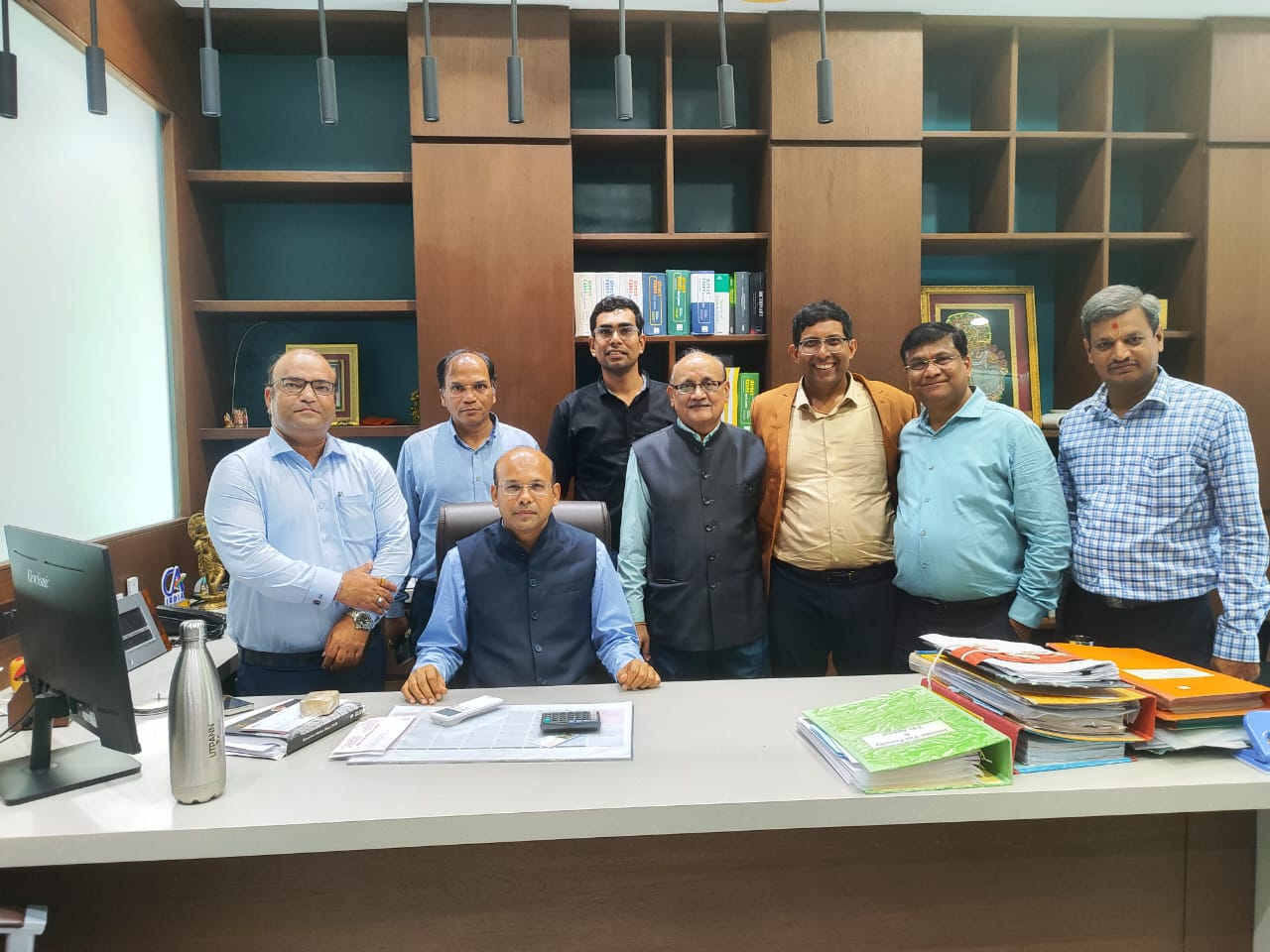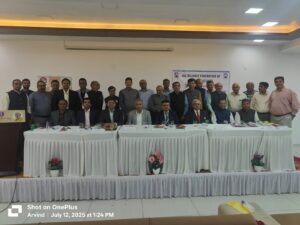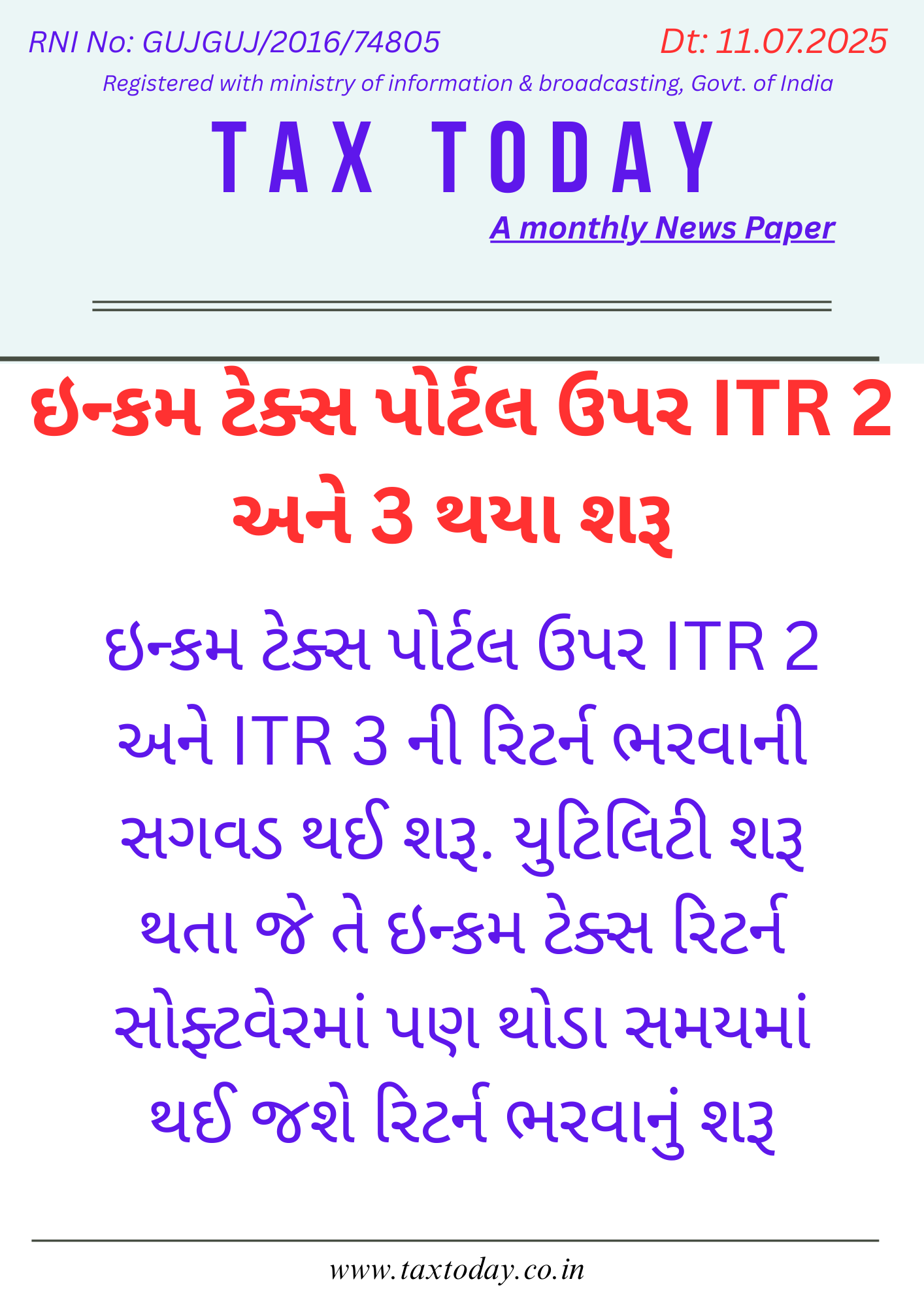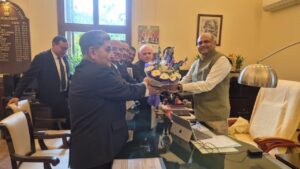GST WEEKLY UPDATE : 39/2023-24 (DATED : 24.12.2023) By CA Vipul Khandhar

By CA Vipul Khandhar
1. GSTN introduced a new feature ‘Grievance Against Payment (GST PMT-07)’ on the GST Portal:
The Goods and Services Tax Network (GSTN) has introduced a new feature on the GST Portal, empowering users to address grievances related to payments through the Grievance against Payment (GST PMT-07) system.
To access this functionality, users can log in to the GST Portal and navigate to the “Services” section. From there, they should proceed to the “Payments” category, where they can find the option to file a “Grievance against Payment (GST PMT-07).”
- CBIC Encourages Taxpayers to Submit GSTR-9 Annual Returns Prior to Deadline:
The Central Board of Indirect Taxes and Customs (CBIC) is encouraging taxpayers to submit their Goods and Services Tax Annual Returns: Form GSTR-9 on or before the specified due date.
3. AAR & Important Judgements:
(i) AAR On GST TREATMENT FOR INCENTIVES UNDER ATMA NIRBHAR GUJARAT SAHAY YOJNA:
(Applicant – Rajkot Nagarik Sahakari Bank Ltd)
Appellant’s Grounds for Appeal:
The Appellant challenged the GAAR ruling on several grounds:
They argued that the incentive is akin to a subsidy and should not be considered as consideration under section 2(31) of the CGST Act.
They contended that the incentive is not covered under the definition of the scope of supply under section 7(2) of the CGST Act.
They claimed that the incentive, even if considered a supply, should be excluded from the value of taxable supply under section 15(2)(e) of the CGST Act.
Analysis and Findings:
A. Subsidy vs. Incentive: The GAAR correctly emphasized the distinction between ‘interest subsidy’ provided to loan beneficiaries and the ‘incentive’ granted to banks based on their performance. The Appellant’s argument that both terms are synonymous was refuted based on the explicit use of different words in the government resolution.
B. Consideration under Section 2(31): The GAAR held that the incentive is a consideration for the services provided by banks in extending loans. The definition of ‘consideration’ under section 2(31) of the CGST Act includes any payment made for the inducement of the supply of goods or services, and there is no exemption for subsidies in this context.
C. Scope of Supply under Section 7(2): The Appellant failed to demonstrate how the incentive falls within the scope of section 7(2) or Schedule III of the CGST Act, and the GAAR ruling stands unchallenged in this regard.
D. Exclusion under Section 15(2)(e): The GAAR rightly dismissed the argument that the incentive should be excluded from the value of taxable supply under section 15(2)(e). The incentive is a consideration for the services rendered by the banks and does not meet the criteria for exclusion.
E. Actionable Claim: The Appellant’s argument that the incentive is an actionable claim was debunked. The definition of ‘actionable claim’ in the CGST Act refers to claims related to debts or beneficial interests in movable property, and the incentive does not fit this definition.
F. Compensation Towards Interest: The Appellant’s claim that the incentive compensates for the lower interest rate charged under the scheme was deemed unsubstantiated. Without clear evidence of the interest rates charged outside the scheme, this argument lacked merit.
G. Case Law References: The reliance on case laws like Rashmi Hospitality Services Ltd. and Ponni Sugars and Chemicals Limited was found to be misplaced, as these cases dealt with different factual and legal scenarios.
Conclusion: In conclusion, the GAAR’s ruling on the GST treatment of incentives under the Atma Nirbhar Gujarat Sahay Yojna is well-founded and legally sound. The incentive received by the Appellant is considered a consideration for the services provided and is therefore liable to GST. This case highlights the importance of understanding the nuances of GST law, especially in the context of government schemes and incentives, to ensure compliance and avoid potential disputes.
(ii) Madras HC remands ITC Claim for Fresh Consideration:
A Single Bench of Madras High Court has remanded the Input Tax Credit (ITC) Claim of Assessee owing to cash crunch that led the assessee to file GSTR-3B and GSTR-2 belatedly and in offline modes, while the same was rejected for belated filing. The petitioner is doing business related to Petroleum Gases and other Gaseous Hydrocarbons in Urangampatty and registered with the respondent department in GSTIN.33BAGPA0449A1ZM and was promptly filing monthly returns. Based on the scrutiny and verification of GSTR-3B returns filed in the financial year 2017-2018 and 2018-2019, the 2nd respondent issued notice dated 27.04.2022 and directed the petitioner to show cause why there was a belated claim of Input Tax Credit (ITC) and also directed to remit back the same as wrong claim of ITC and proposed to reverse the same. Further it is alleged that the petitioner had claimed on the purchase of Petroleum product. The petitioner submitted that due to financial crisis the petitioner had submitted GSTR-3B physically and the same was already explained to the respondents in person through his Accountant and hence the allegation by the respondents that the said claim is false and cannot be accepted. The contention of the petitioner is that he had also explained the fact that the claim of ITC is described under Rule 60 of the TNGST Rules and the Form prescribed is Form GSTR-2, but the same was not notified. Moreover, the filing of GSTR-3B is to avail the input tax credit and not for claiming the same. So the reversal of input tax for belated claim as per Section 16(4) of TNGST Act is not applicable, since the filing of GSTR3B is not meant for claim of input tax credit. The further contention of the petitioner is that the sales made to the petitioner and the tax collected from the petitioner were duly reported by other end suppliers through their respective GSTR-1 and the petitioner could not claim the same since Form GSTR-2 is not notified. The bench noted that the petitioner has accounted for the purchases and credited the tax payment made through tax invoice, claimed ITC in the books of accounts and availed the same through GSTR-3B filed physically holding that, the allegation of belated claim of ITC itself is false and misleading. The 2nd respondent, The Deputy State Tax Officer-1 had filed a counter affidavit in both the writ petitions stating that the writ petitions are not maintainable since the petitioner has an alternative remedy to prefer an appeal before the jurisdictional Appellate Deputy Commissioner (GST Appeals). Prima facie the revision of assessment was made out based on the scrutiny of GSTR-3B returns and hence notices in Form- GST-DRC-01A (Rule 142(i)) were issued to explain the issue with the documentary evidences why there was a belated claim of ITC. It was added that the statute is very clear that the burden of proof is lying with the taxable person and he has to prove that there is no evasion of tax. It was further submitted that, “The taxable person is mandated to file monthly returns only electronically and not by manually. Since the petitioner had not filed any objections and had not attended the personal hearing, the respondents left with no other option than to confirm the proposal already made in the notice. Accordingly, the order, dated 16.08.2022, was passed.” Therefore, the 2nd respondent prayed to dismiss the writ petitions. The Bench heard Raja Karthikeyan, Counsel appearing for the petitioner in both the writ petitions and A.K.Manikkam, Special Government Pleader appearing for the respondents in both the writ petitions and perused the records. It was observed that, “the respondents without giving any opportunity to file the returns by notifying the Form GSTR-2, cannot expect the taxable person to file returns. In fact, the petitioner has no intension to violate the provisions of the Act.” “In order to show his bonafide, he has filed physically. Moreover, all tax liability is paid and there is no loss to the department. Moreover, the petitioner has also claimed financial crisis. Even though the financial crisis cannot be a ground for not filing the returns in time, not notifying of Form GSTR-2 is clearly a ground to consider the petitioner’s claim of belated returns”, the bench further noted. It was further noted, with the relevant issue in mind, that, “The next contention of the petitioner is that the ITC can be claimed through GSTR-3B, but GSTN has not permitted to file GSTR-3B in online if the dealers had not paid taxes on the outward supply / sales. In other words, if the dealer is not enabled to pay output tax, he is not permitted to file GSTR-3B return in online and it is indirectly obstructing the dealer to claim ITC.” Further, In the present case the petitioner was unable to pay output taxes and so the GSTN not permitted to file GSTR-3B in the departmental web portal it is constructed that the petitioner had not filed GSTR-3B online, that resulted the dealer unable to claim his ITC in that particular year in which he paid taxes in his purchases The most important observations being, “Hence if the GSTN provided option for filing GSTN without payment of tax or incomplete GSTR-3B, the dealer would be eligible for claiming of input tax credit. The same was not provided in GSTN network hence, the dealers are restricted to claim ITC on the ground of non-filing of GSTR-3B within prescribed time. if the option of filing incomplete filing of GSTR-3B are provided in the GSTN network the dealers would avail the claim and determine self-assessed ITC in online. The petitioner had expressed real practical difficulty. The GST Council may be the appropriate authority but the respondents ought to take steps to rectify the same. Until then the respondents ought to allow the dealers to file returns manually”, the bench allowed the appeal in favour of the assessee. The Single Bench of Justice S Srimathy thus held that, “impugned orders are quashed. The respondents shall permit the petitioner to file manual returns whenever the petitioner is claiming ITC on the outward supply / sales without paying taxes. Further the respondents are directed accept the belated returns and if the returns are otherwise in order and accordance to law, the claim of ITC may be allowed. Hence, the matter is remitted back to the authorities for reconsideration.” The Madras High Court’s observation regarding the hindrance created by the absence of an option to file incomplete GSTR-3B online highlights the need for improvements in the GSTN infrastructure. The suggestion that the GST Council should address these practical difficulties and consider allowing manual filing until online options are optimized adds a policy dimension to the judgment
Disclaimer:
This publication contains information for general guidance only. It is not intended to address the circumstances of any particular individual or entity. Although the best of endeavour has been made to provide the provisions in a simpler and accurate form, there is no substitute to detailed research with regard to the specific situation of a particular individual or entity. We do not accept any responsibility for loss incurred by any person for acting or refraining to act as a result of any matter in this publication.
THANKING YOU.





